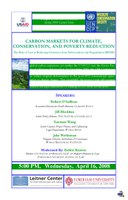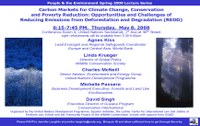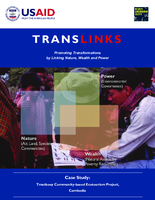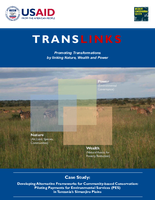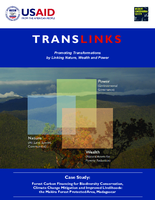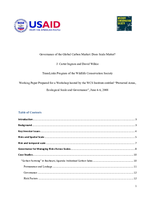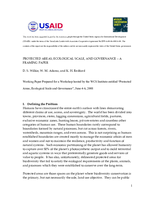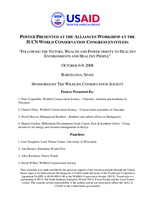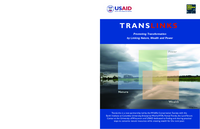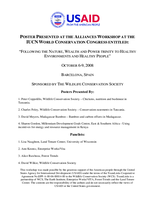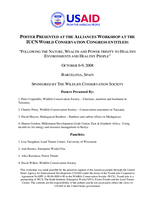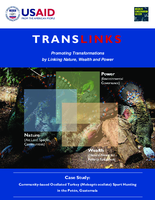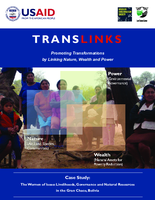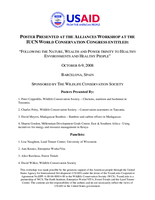Wildlife Conservation Society
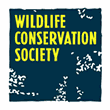
2008
2008 Carbon Markets, Conservation, and Poverty Reduction Panel Event - The Role of Law in REDD (New York, USA)
Panel event on "Carbon Markets for Climate Change, Conservation and Poverty Reduction: The Role of Law in Reducing Emissions from Deforestation and Degradation (REDD)" held on April 16, 2008 at Fordham Law School in New York. The event was organized by the United Nations Development Programme, the Leitner Center for International Law and Justice at Fordham Law School and Wildlife Conservation Society, with support from USAID through the TransLinks cooperative agreement. Event was part of the People & the Environment Spring 2008 Lecture Series.
2008 Carbon Markets, Conservation, and Poverty Reduction Panel and Side Event- Opportunities and Challenges of REDD (New York, USA)
Panel and side event on "Carbon Markets for Climate Change, Conservation and Poverty Reduction: Opportunities and Challenges of Reducing Emissions from Deforestation and Degradation (REDD)" held on May 8, 2008 at the Commission on Sustainable Development (CSD) meeting at the United Nations. The event was organized by the United Nations Development Programme, Equator Initiative, the Leitner Center for International Law and Justice at Fordham Law School and Wildlife Conservation Society, with support from USAID through the TransLinks cooperative agreement. Event was part of the People & the Environment Spring 2008 Lecture Series.
2008 TransLinks REDD Training (Lima, Peru)
September 10 -12, 2008, Lima, Peru - Course, hosted by the Wildlife Conservation Society, with support from USAID through the TransLinks cooperative agreement, on developing forest carbon projects in tropical countries, including identification and approaches for engagement with government staff on national climate change mitigation policies. Featured case studies of WCS REDD projects in development.
CaseStudy_TmatboeyCommunityEcotourismCambodia.pdf
Tmatboey Community-Based Ecotourism Project, Cambodia
Case study of the Tmatboey Ibis Project which aims to conserve the globally threatened large waterbirds found at Tmatboey, Cambodiam using the ibises as ‘flagships’, by establishing a local community-based tourism enterprise that directly links revenue received to long-term species conservation.
Developing Alternative Frameworks for Community-based Conservation: Piloting Payments for Environmental Services (PES) in Tanzania's Simanjiro Plains
Case study on piloting payments for environmental services (PES) in the Simanjiro Plains, Tanzania - The Simanjiro plains provide a key wet season dispersal area for wildebeest and zebra migrating from northern Tanzania’s Tarangire National Park. The plains lie within the boundaries of the lands of three villages occupied by Maasai pastoralists. Wildlife populations have declined substantially over the past two decades, largely as a result of illegal over-hunting and the spread of agricultural land uses in the area. Efforts to enlist local community support for wildlife conservation have, since the 1970s, been undermined by conflicts over land tenure and resource use. In order to address the deteriorating status of wildlife populations and their habitat on the Simanjiro plains, an alternative framework for community-based conservation was developed starting in 2005 through a payments for ecosystem services (PES) agreement. This agreement emerged from the collaboration of local communities with a diverse group of NGOs and private tourism companies,several of which have extensive and long-term experience in the area. The agreement builds on customary pastoralist land use practices to build village-level incentives for wildlife conservation.The agreement has produced an important new framework for community-based conservation in Tanzanian village lands by overcoming existing institutional impediments to community involvement in wildlife conservation through a cost-effective and administratively simple PES structure.
Forest Carbon Financing for Biodiversity Conservation, Climate Change Mitigation and Improved Livelihoods: the Makira Forest Protected Area, Madagascar
Case study of the forest carbon project in Makira Forest, Madagascar. Wildlife Conservation Society, the Government of Madagascar and other partners have been working with local communities living in the Makira plateau in north-eastern Madagascar to establish a protected area which will be financed by the marketing and sale of CO2 emissions reductions credits. The funds from carbon sales, generated through the avoided deforestation of the Makira forest, will be used to finance the longterm conservation of the forests, improve community land stewardship and governance, and support sustainable livelihood practicesleading to improved household welfare. This study outlines the process and key steps that have been taken to develop this novel and innovative approach towards forest conservation and poverty reduction in one of the world’s most biologically rich and economically poor countries.
Governance of the Global Carbon Market: Does Scale Matter?
Governance of the Global Carbon Market: Does Scale Matter?
Protected Areas, Ecological Scale, and Governance-A Framing Paper
Protected Areas, Ecological Scale, and Governance-A Framing Paper
Madagascar Bamboo A Sustainable Business Model for Conservation (Poster)
Poster on bamboo and carbon offsets in Madagascar. Poster was presented at the Alliances Workshop at the IUCN World Conservation Congress entitled "Following the Nature, Wealth and Power Trinity to Healthy Environments and Healthy People" held October 6-9, in Barcelona, Spain. The event was sponsored by Wildlife Conservation Society with support from USAID through the TransLinks cooperative agreement.
TransLinks Promoting Transformation by Linking Nature, Wealth and Power
Overview of USAID TransLinks Program
Protein Substitution or Supplementation? Improving Poultry Production for Sustainability in the Ruaha Landscape, Tanzania (Poster)
Poster on chickens, nutrition and bushmeat in Tanzania. This poster was presented at the Alliances Workshop at the IUCN World Conservation Congress entitled "Following the Nature, Wealth and Power Trinity to Healthy Environments and Healthy People" held October 6-9, in Barcelona, Spain. The event was sponsored by Wildlife Conservation Society with support from USAID through the TransLinks cooperative agreement.
Private sector payments for conservation and livelihoods in the Simanjiro Plains, Tanzania (Poster)
Poster on on private sector payments for conservation and livelihoods in the Simanjiro Plains, Tanzania. This poster was presented at the Alliances Workshop at the IUCN World Conservation Congress entitled "Following the Nature, Wealth and Power Trinity to Healthy Environments and Healthy People" held October 6-9, in Barcelona, Spain. The event was sponsored by Wildlife Conservation Society with support from USAID through the TransLinks cooperative agreement.
Community-Based Ocellated Turkey (Meleagris ocellata) Sport Hunting in the Petén, Guatemala
Case study of a community-based payment for ecosystem (PES)/trophy hunting scheme for conservation in Guatemala. This case study reviews the establishment of an ocellated turkey hunting enterprise in the Petén of Guatemala that was designed to generate profits to support local livelihoods and, thus, to motivate local communities to sustainably manage the forest and its wildlife resources. This paper was updated in the journal of Forest Ecology and Management in 2012, also in the portal library.
Women of Isoso: Livelihoods, Governance and Natural Resources in the Gran Chaco, Bolivia
The Women of Isoso: Livelihoods, Governance and Natural Resources in the Gran Chaco, Bolivia. This TransLinks case study builds on over 15 years of experience of an indigenous terrirorial organization and an international NGO (Wildlife Conservation Society) working collaboratively in the weastern Bolivia lowlands to put in place durable mechanisms for economic development through sustainable community-based management of natural resources. Among the outcomes of this collaboration, the Isoso Guarani, in negotiations with the Bolivian State, established the Kaa Iya National Park and the Isoso Comunitaria de Origen (TCO) within the larger Gran Chaco area of Bolivia. The case documents the evolution of the role of women within the Isosonyo indigenous peoples' organization CABI, and their growing influence on the governance of natural resources for sustainable economic development within the Isosenyo TCO. This initiative received USAID/Bolivia funding from 1995 to 2003.
Environment and Poverty Efforts in Kenya to Get the Policy Right (Poster)
Poster presented at the Alliances Workshop at the IUCN World Conservation Congress entitled "Following the Nature, Wealth and Power Trinity to Healthy Environments and Healthy People" held October 6-9, in Barcelona, Spain. The event was sponsored by Wildlife Conservation Society with support from USAID through the TransLinks cooperative agreement.
TransLinks Annual Report for 2008
A Program of the Wildlife Conservation Society in partnership with the Center for Environmental Research and Conservation (CERC) of the Earth Institute (EI) at Columbia University, Enterprise Works/VITA (EWV), Forest Trends (FT), and the Nelson Institute/Land Tenure Center (NI/LTC) at the University of Wisconsin supported by the United States Agency for International Development (USAID).


